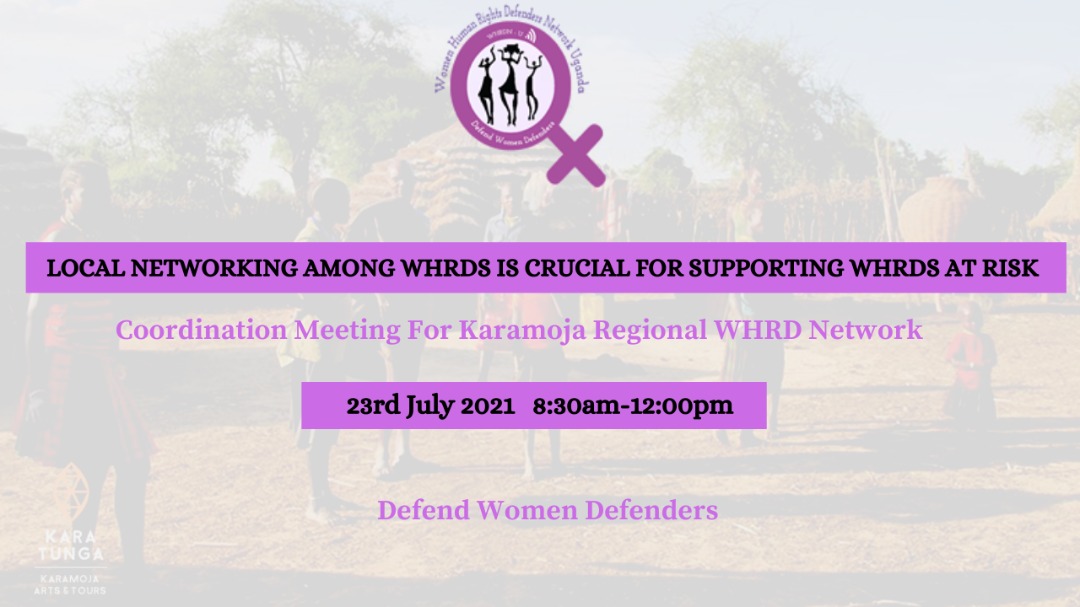The Women Human Rights Defenders Network Uganda (WHRDN-U) seeks to support and facilitate WHRD regional network coordination. The key aim is to help improve response and the effectiveness of the local regional WHRD network mechanisms in rural contexts. On 23rd July 2021, under the theme “Local Networking among WHRDs is crucial for supporting WHRDs at risk,’’ WHRDN-U conducted a zoom coordination meeting for over 14 WHRDs as a space to help improve collective understanding around coordination, documenting incidences of attacks and reports cases of WHRDs at risk to WHRDN-U secretariat. While the meeting was online, the WHRDs converged in physical locations in Amudat, Moroto, Kaabong, Nakapiririt, Napak, Nanduget and Kotido districts of Karamoja region.
Ms. Brenda Kugonza, of the WHRDN-U outlined the meeting objective stating that the discussions will cover, situation of women defenders in the region, gathering information on attacks. submission of reports and documentation of attacks.
Ms. Brenda Kugonza, gave an overview of the situation, highlighting the human rights work done by WHRDs, the reports on challenges, threats and fears Rwenzori WHRDs received at secretariat. Ms. Brenda acknowledged that WHRDs in the region were involved in defending land rights, freedom of speech, access to information, mining and environmental rights and fighting against GBV/Violence against children, patriarchy and Female Genital Mutilation. Ms. Brenda informed participants that the WHRDN-U secretariat was receiving reports of violations against women defenders in Karamoja region notably; restrictions on their freedom of expression, state actors’ refusal to recognize the work of women defenders in the region, infringing on their right to association and lack of appreciation of the work of WHRDs from their communities, discrimination and intimidation. She further inquired if some participants were experiencing similar challenges & threats. With regards to threats and challenges, below are WHRD’s voice;
- Sending threatening pictures like a man holding a gun, shared Alosikin Merab from Amudat district.
- Restrictions on access to information ‘sometimes you go to police to defend someone and they don’t give you any information’ said Nambuya Fiona from Moroto district.
- Threats of losing marriages and not being married – ‘husbands are always told that they can’t control a woman who is a WHRD’ revealed Mary Lopuka from Nakapiririt district.
- When you are sensitizing communities about FGM, they tell you, you must be a victim of FGM that is the reason why you know all about it, mentioned Cepohysiyo Janet from Amudat district.
In addition, participants were informed that they face a variety of problems related to their mental and physical health. In particular, the issues related to showing signs of fatigue, exhaustion and stress which indicated lack of self-care for themselves. Brenda Kugonza asked why WHRDs neglected their own self-care & wellbeing. In response, Dorcus Chelain from Amudat district said ‘’we feel guilty to take breaks yet our people need us- sometimes we are overwhelmed with many sad cases that need our urgent attention.’’ Thus, the meeting highlighted the importance of selfcare and well-being and recommended that WHRDs learn to take off breaks for their own self-care and healing in order to avoid burn-outs, stress and also relax to feel better. For instance, “let’s create healing spaces for women defenders in regions to remove stress and traumas,’’ said Joyce Chemutai from Amudat district.
In conclusion, the meeting provided a great platform for dialogue and collaboration to review the need for stronger local support networks for WHRDs. The participants formulated recommendations to improve coordination, networking and support WHRDs at risk. They included;
- Timely reporting of incidence of threats against WHRDs to WHRDN-U secretariat
- Members suggested to have regular coordination meetings
- Requested WHRDN-U team to visit regions when COVID-19 lock down measures are eased to provide on-site mentoring support to regional focal persons.
- Exchanged telephone contacts to maintain communication and sharing of information
- “Regional networks will help denounce violations against women defenders”, said Amiya Shannon from Napak district.
- “Regional coordination meetings will help to promote recognition of women’s work and contribution in human rights.” Dorcus Chelain of Amudat district.
Members shared contacts during the zoom meeting as seen below.

Members participating in the meeting.

